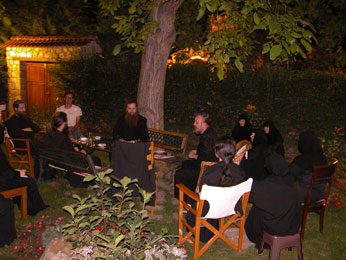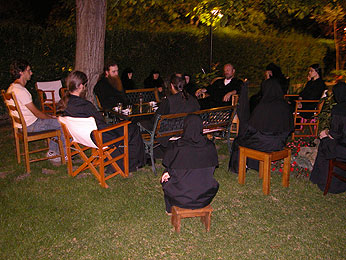Anniversary ( 27.08.2007 )
On the occasion of 12 years from his consecration as Episcope, today Metropolitan Nahum of Strumica celebrated Hierarchical Divine Liturgy in the chapel of Saint Gregory Palamas and Elder Joseph the Cave-dweller, in the Vodoča monastery of Saint Leontius. In the evening, His Eminence Nahum held a synaxis in the monastery of the Most Holy Theotokos Eleusa, on the subject: “What one who desires to enter a monastery must first become aware of and know”.


“My children, today’s lecture is inspired by two meetings and conversations I had earlier this day with a brother and a sister of yours, who revealed to me their wish to come and stay in our monasteries.
Entering a monastery is a matter of personal choice and decision, not of predestination. It is also a very concrete resolution, since all who want to stay in a monastery should know exactly why they are coming, what is expected of them, what they should expect, how they should act etc.
One who has decided to live in a monastery must first of all become aware that he is sick and sinful; that Christ came to save the sick and the sinful, not them who regard themselves healthy and just.
Our passions cause our ill condition and sinfulness. The strife for glory and power, strife for money and possession, and the inclination towards bodily indulgence as recurring time and again have become our second nature. We are enslaved by sin, inebriated by its appeal. Our fallen and captured mind is proud, distracted, and darkened; our willpower and desire for good are slackened.
Yet the newcomer should also know his chief struggle after coming to the monastery will not be against the passion of avarice, or against the passion of pleasure-indulgence, but against the passion of vainglory. Usually, we free ourselves from the former two passions already at our entering the Church, after our first confession, at the beginning of our Orthodox spiritual life. However, ascetical experience shows us that it is rather hard for us to renounce our high self-esteem and our mind as the criterion of all visible and invisible. The mind’s captivity by pride, by high self-esteem is the sole reason due to which even after so long a time spent in a monastery, with no conditions and no strivings for nourishment of the passions of avarice and pleasure-indulgence, most of us do not have the gift of mind-and-heart prayer. When we have freed our heart to a sufficient extent from this passion as well, then we will also receive the gift of prayer in the heart.
So, in order to make a good start and achieve the first and temporary aim—opening of the heart and mind-and-heart prayer, one who comes to a monastery should be aware of the fact that his mind is proud, distracted, and darkened—a state that every sensible man can quite easily recognise by the quality and quantity of his prayer. Moreover, he must also know that he should transform his mind, through ascetical and hesychastic struggle, into being humble, collected, and illumined. This transformation of the mind in essence is a change of mind. The phrase ‘a change of mind’ is a literal translation of the Greek word μετάνοια, which in our language has been translated as repentance. Accordingly, one who comes to a monastery has a feat of repentance ahead i.e. a feat of a change of mind. In practice, it means that first and foremost one should subordinate his mind to his spiritual father’s mind through absolute obedience. He/she should likewise try to be obedient to all the monastery brothers/sisters, as long as it is in accord with and within the obedience to the spiritual father. It is a struggle for taking the lowest place, mentioned in the Gospel, for which one literally has to fight rather than avoid it with might and main. He must stay at this lowest place all until he is called to a higher position, that is, until he receives the gift of the mind-and-heart prayer. In monastery daily life it also implies that he should see to it that he sooner fulfils someone else’s wish and will than his own.
Thus, when the newcomer enters into obedience of his free will and with love, that is, when he subordinates his mind to his spiritual father’s mind, from that moment on begins also the process of his spiritual healing; the purification of his mind’s energy begins, and through the energy the essence of the mind, which is in the heart, is also purified. The passion of vainglory ceases to be fed and its transformation begins. It is in the absolute, concrete, and direct obedience that we find the meaning of our monastic struggle. We have all else in the world, too…
The newcomer should stay in this struggle, enduring with gratitude to God all the trials and hardships he will undergo. He should not resent against the situations when his vanity is hurt; for, these merely assist him to see what is in his heart, what he must cleanse in it. Therefore did the holy desert Fathers use to say that were there no trials, no one could be saved. I would allow myself a licence in interpreting this and say that if there were no trials, no one could attaint perfection. Moreover, in all the trials, the newcomer must recognise the abundant love of God for him. Since, the physician, too, when he wants to help us and clean our wound, does something that at the moment causes us pain. Yet, about this some other time…
With his absolute obedience to his spiritual father, the newcomer actually shows in practice his faith and trust in God’s love and providence for his salvation. “Most assuredly, I say to you, he who receives whomever I send receives Me; and he who receives Me receives Him who sent Me” (John 13:20). That is why obedience i.e. spiritual guidance should not be understood as idolatrous, but within the frames of our building a union and relationship with God: “You were bought at a price; do not become slaves of men” (1 Cor. 7:23). This is a crucial point in the practice of obedience that one must not overlook!
If, however, after entering the monastery the newcomer seeks to put into practice some idea or plan of his or if in everyday things he favours his will, by this he only shows he does not trust God but himself—that is, he trusts his ill mind. In this way, he misses the mark completely at the very beginning and leaves his heart bound and defiled by the passion of vainglory. There is no illumination, no deification. Pride (vainglory) manifests itself in various ways, yet in essence, it is a distrust of God and of His love and providence for us: “How can you believe, who receive honour from one another, and do not seek the honour that comes from the only God?” (John 5:44). And, in practice, it manifests itself as disobedience to one’s spiritual father and as impatience and ingratitude in trials.
Let us sum up: What everyone who wishes to enter and stay in a monastery must first become aware of is his sick and sinful condition, particularly his confinement by the passion of vainglory. Whereas, what everyone must first acquaint oneself with is Patristic experience and knowledge that this passion is cured in a concrete and absolute obedience, which is based on one’s faith and trust in God’s love and providence for him and which manifests itself as persevering patience with gratitude to God for all the trials and hardships that befall him.
We may also note the following: With all these—the absolute obedience to our spiritual father, the faith and trust in God’s love and providence for us, and also the persevering patience with gratitude to God for all the trials and hardships that befall us—we in fact stop feeding the passion of our mind (vainglory i.e. pride, high self-esteem), and enter the process of healing, the process of purification of the heart from passions, of illumination of the mind, and of deification of our person created in the image of God.”
(as recorded by the monastery sisterhood)